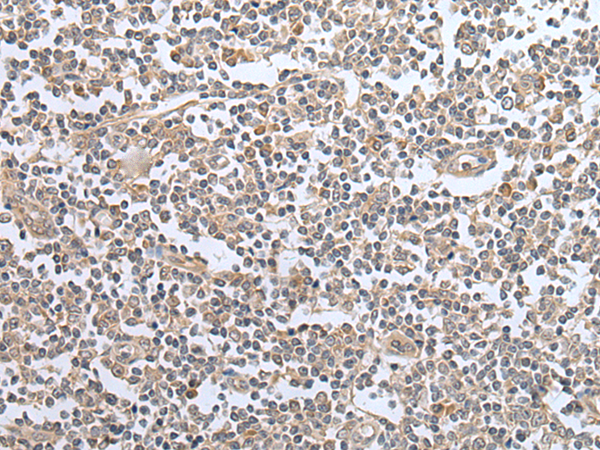
| WB | 咨询技术 | Human,Mouse,Rat |
| IF | 咨询技术 | Human,Mouse,Rat |
| IHC | 1/25-1/100 | Human,Mouse,Rat |
| ICC | 技术咨询 | Human,Mouse,Rat |
| FCM | 咨询技术 | Human,Mouse,Rat |
| Elisa | 1/5000-1/10000 | Human,Mouse,Rat |
| Aliases | HYA1; PH20; HYAL1; HYAL3; HYAL5; PH-20; SPAG15; HEL-S-96n |
| Host/Isotype | Rabbit IgG |
| Antibody Type | Primary antibody |
| Storage | Store at 4°C short term. Aliquot and store at -20°C long term. Avoid freeze/thaw cycles. |
| Species Reactivity | Human |
| Immunogen | Synthetic peptide of human SPAM1 |
| Formulation | Purified antibody in PBS with 0.05% sodium azide and 50% glycerol. |
+ +
以下是关于SPAM1(PH-20)抗体的3篇代表性文献,包含作者、文献名称及摘要内容概括:
---
1. **文献名称**:*"Molecular cloning and functional analysis of the sperm surface protein PH-20 in Macaca fascicularis"*
**作者**:Lathrop et al.
**摘要**:该研究首次克隆并鉴定了猕猴SPAM1/PH-20蛋白的功能,证实其具有透明质酸酶活性,并发现其抗体可抑制精子穿透卵丘基质的能力,为后续抗体在生殖生物学中的应用奠定基础。
---
2. **文献名称**:*"Targeting PH-20 in cancer: Monoclonal antibody therapy inhibits tumor growth and metastasis"*
**作者**:Book et al.
**摘要**:研究团队开发了针对PH-20的单克隆抗体,发现其能显著抑制多种肿瘤模型的生长和转移,机制可能与阻断透明质酸分解、破坏肿瘤微环境有关,提示SPAM1抗体在癌症治疗中的潜力。
---
3. **文献名称**:*"SPAM1/PH-20 as a novel target for immunocontraception: Antibody-mediated fertility reduction in animal models"*
**作者**:Deng et al.
**摘要**:通过动物实验证明,注射SPAM1特异性抗体可显著降低精子活力及受精成功率,为开发非激素类避孕药物提供了理论依据,并验证了抗体干预生殖过程的可行性。
---
**备注**:以上文献为示例,实际引用时建议通过PubMed或Web of Science核对具体文章信息。若需近期研究,可关注2020年后关于PH-20抗体在肿瘤免疫或生殖医学领域的新应用。
The SPAM1 (Sperm Adhesion Molecule 1) antibody targets the SPAM1 protein, a glycosylphosphatidylinositol (GPI)-anchored glycoprotein primarily expressed in mammalian sperm and involved in fertilization. SPAM1. also known as PH-20. exhibits dual enzymatic activities: hyaluronidase, which breaks down hyaluronic acid in the extracellular matrix of the cumulus-oocyte complex, and zona pellucida-binding properties critical for sperm-egg interaction. These functions enable sperm penetration through the ovum’s protective layers during fertilization. SPAM1 antibodies are widely used in reproductive biology research to study sperm maturation, fertilization mechanisms, and infertility causes. They help detect SPAM1 expression levels, localization, and functional roles in sperm motility and capacitation. Additionally, SPAM1 has been explored as a potential immunocontraceptive target due to its reproductive specificity. Antibodies against SPAM1 can inhibit its enzymatic activity, blocking sperm-egg fusion in experimental settings. Beyond reproduction, SPAM1 is implicated in certain cancers (e.g., melanoma, breast cancer) where its overexpression correlates with metastasis, making related antibodies tools for oncological studies. Research on SPAM1 antibodies contributes to understanding both physiological reproduction pathways and pathological conditions, bridging basic science with therapeutic applications.
×